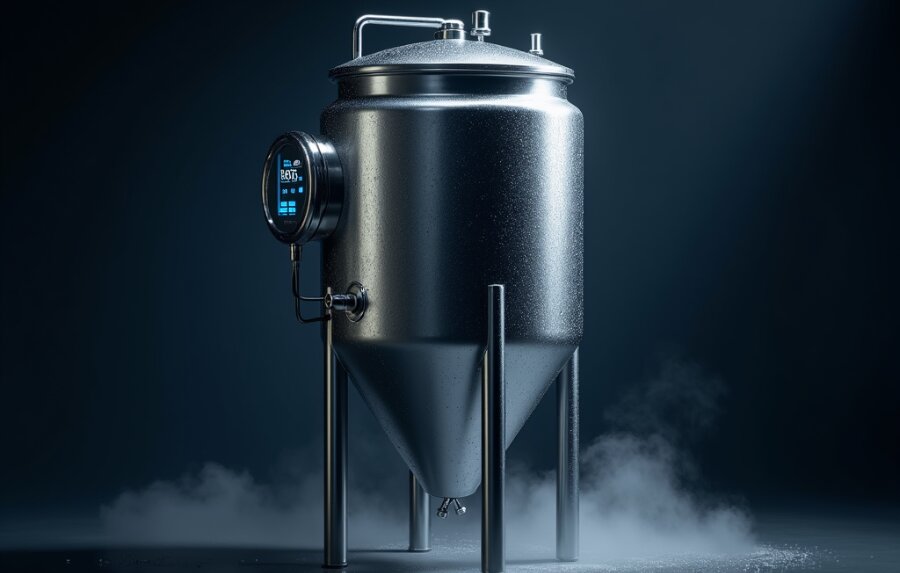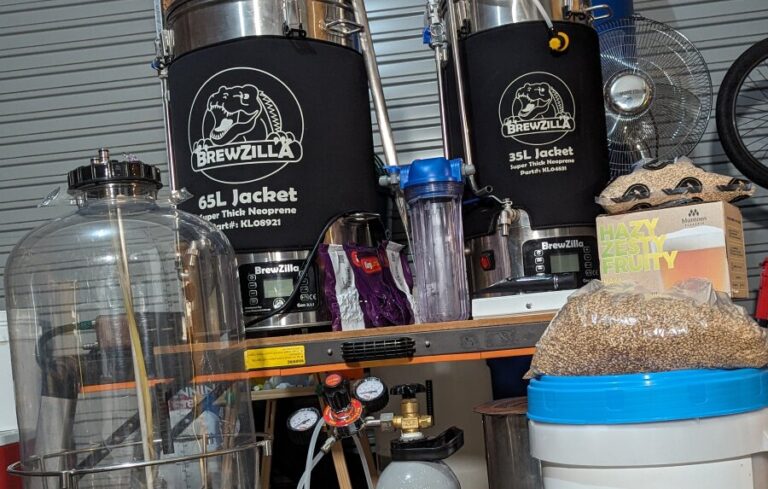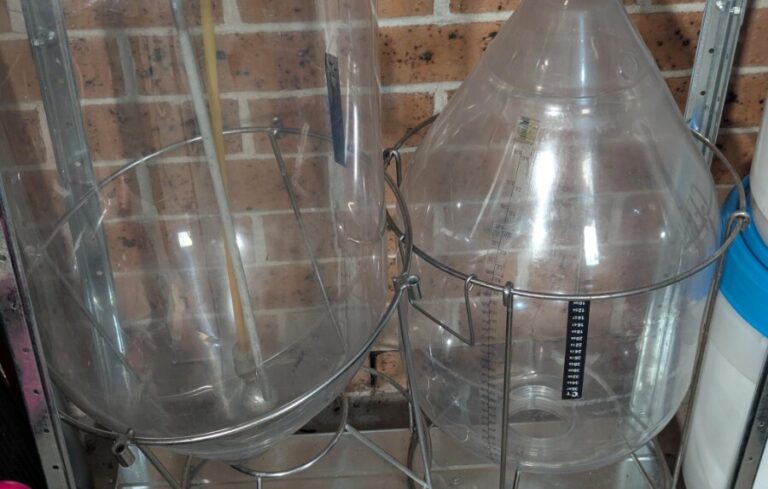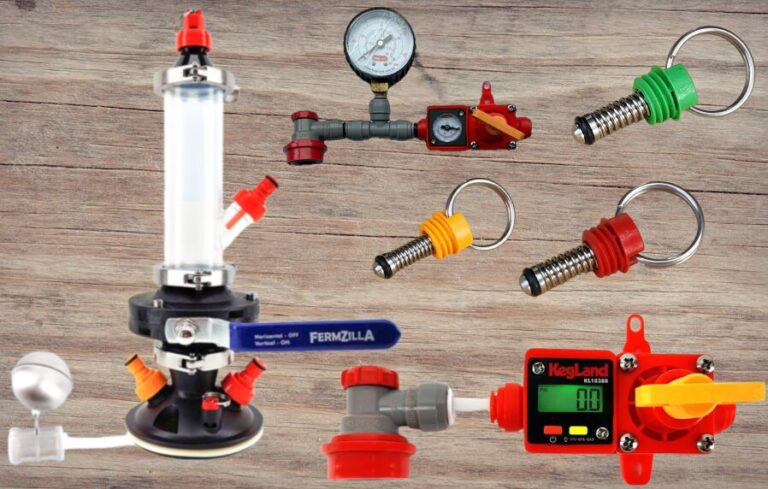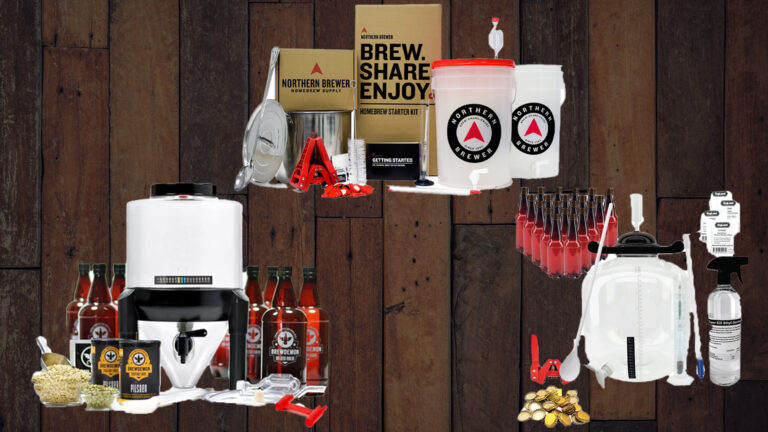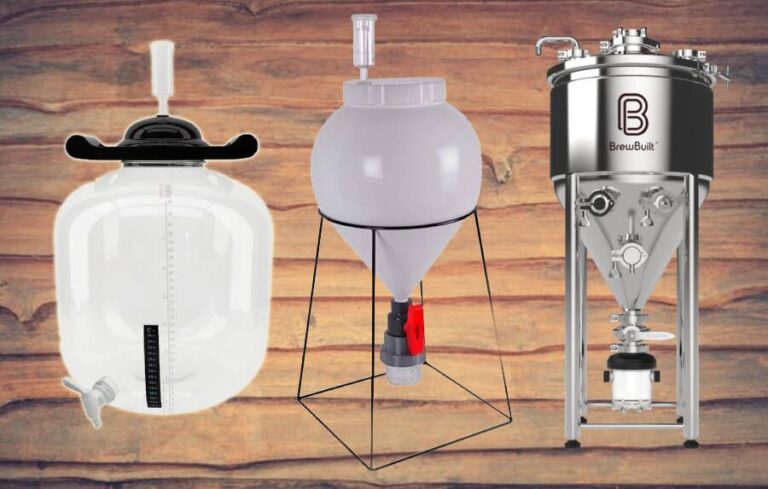Our evaluations and product assessments are conducted using a thorough and unbiased approach. Should you choose to buy any items through our provided links, we might receive a commission Read our disclosures.
Benefits of Conical Fermenters with Temperature Control
When I embarked on my beer-brewing journey, the game-changer for me was discovering conical fermenters with temperature control. These beauties have transformed my brewing process. Here’s why.
Fermentation Made Easy
Conical fermenters simplify things. They let you handle both primary and secondary fermentation in a single vessel. Forget the headache of transferring beer to another container. This cuts contamination and oxidation risks in half (Bräu Supply). Plus, saving time rocks and I sleep better knowing my brew’s safe from unwanted germs.
With one vessel doing all the work, my setup got a major upgrade. Checking on fermentation progress is a breeze now. No more juggling multiple containers. These fermenters come with snazzy features like sample ports and handy valves for hassle-free monitoring.
Clearer, Tastier Beer
Conical fermenters with temperature control offer precise fermentation conditions, resulting in enhanced flavor profiles and consistency in brewing.
One thing that really stands out is the clarity of beer from a conical fermenter. The cone-shaped bottom works magic, separating yeast and other materials as they settle. This makes it super easy to get clean, clear beer every time (Bräu Supply).
Getting rid of the gunk means fewer off-flavors and weird smells. I get to enjoy the true essence of my brew. If you’re thinking of brewing your own beer, do yourself a favor and check out a conical fermenter with temperature control. These fermenters are ideal for any serious brewer.
Quick Benefits Rundown:
| Benefit | Description |
|---|---|
| Simplified Fermentation | Handles primary and secondary fermentation in one go, lessening contamination risk. |
| Better Beer Clarity | Cone bottom helps remove sediment, ensuring clearer and tastier beer. |
These perks have taken my brewing to the next level, and they can do the same for you. For more tips on brewing gear, check out our list of conical fermenter accessories or explore affordable conical fermenter options.
Different Kinds of Conical Fermenters
When I first dipped my toes into homebrewing, I quickly realized that picking the right fermenter can make or break your beer. Here’s the lowdown on the three big players: stainless steel, PET plastic, and unitanks. Each has its own perks and quirks, ready to suit different brewing vibes.
Stainless Steel Conical Fermenters
If you’re serious about your brew, stainless steel fermenters are the Cadillac of conicals. They’re tough, don’t rust, and can last you a lifetime. Plus, they’re a breeze to clean and won’t hang onto any funky smells or flavors.
One thing that really tickles me pink is the way these bad boys let you control temperature. When I’m cooking up a big batch, keeping things cool and steady is a game-changer for flavor. The catch? They’ll cost you a pretty penny. But hey, you get what you pay for.
| Feature | Stainless Steel Conical Fermenters |
|---|---|
| Durability | Top-notch |
| Cleaning | Super easy |
| Temperature Control | Spot on |
| Cost | Pricey |
Wondering what accessories to snag? Peek at my conical fermenter accessories guide.
PET Plastic Conical Fermenters
New to brewing? PET plastic fermenters might be your best buddy. They’re light, easy to move around, and won’t break the bank. Perfect for rookies or anyone brewing smaller batches.
Sure, they’re not as tough as stainless steel, and they don’t keep temps in check as well, but they’re a solid starter option. They strike a fine balance between quality and affordability.
| Feature | PET Plastic Conical Fermenters |
|---|---|
| Durability | Decent |
| Cleaning | Not bad |
| Temperature Control | Meh |
| Cost | Wallet-friendly |
Trying to save some cash? Check out my list of cheap conical fermenter options.
Unitanks
Fancy an all-in-one gizmo? Look at unitanks. They let you ferment and serve from the same tank, even carbonate your beer right in there. They’re versatile, but a bit tricky for newbies.
Unitanks handle pressure, which is handy for styles like lagers. Just be ready to shell out more dough for these fancy features.
| Feature | Unitanks |
|---|---|
| Versatility | High |
| Ease of Use | Can be tricky |
| Pressure Capable | Yes |
| Cost | Expensive |
Need help setting up? Take a gander at my conical fermenter setup guide.
All three fermenters get the job done. Pick one that suits your brewing style, and you’ll be on your way to making some killer homebrew!

Picking the Right Conical Fermenter: What You Need to Know
Choosing the perfect conical fermenter can seriously level up your homebrew game. Here’s what you need to keep in mind when making your pick.
How Much and How Often?
First off, think about how big your batches usually are and how often you brew. Conical fermenters come in all sorts of sizes, generally measured in gallons or liters. For most folks, a 5-gallon or a 10-gallon fermenter gets the job done. Your choice hinges on your brewing habits and the space you have for fermentation (Micet Group).
| Fermenter Size | Batch Size | How Often You Brew |
|---|---|---|
| 5 Gallon | Up to 5 gallons | Once in a blue moon |
| 10 Gallon | Up to 10 gallons | Pretty regularly |
| 15 Gallon | Up to 15 gallons | Often, like a pro |
Got Space?
Space is a biggie. If your storage area is cramped, your fermenter needs to fit snugly. Take Lee and Taylor, who nabbed two 15-gallon plastic conical fermenters. This genius move let them ferment at least 10 gallons at a time without breaking the bank or cramping their style (American Homebrewers Association).
These fermenters can be found in a spectrum of sizes and are usually crafted from food-grade stainless steel. If you spring for one with bells and whistles like temperature controls or pressure gauges, double-check it’ll fit your brewing digs (Micet Group).
Count the Cost and Pick Your Material
Money matters. Stainless steel conical fermenters are tough as nails and ace at keeping temperatures just right, which is a game-changer if you’re brewing big. But, they’re also pricier (Micet Group).
Plastic fermenters, on the flip side, are usually kinder to your wallet and great if you’re just starting out. They’re lighter, easier to wrangle, but might not be as hardy or efficient at managing temperature (Micet Group).
Weighing these bits and bobs helps you pick a fermenter that fits your brewing dreams. If you’re keen to add some cool conical fermenter accessories or you’re on the hunt for wallet-friendly fermenter options, there’s something out there for everyone. Brewing small batches? Check out small batch conical fermenters designed just for you.
Why Stainless Steel Conical Fermenters Rock for Homebrewing
Once you dive into brewing your own beer, you’ll quickly find that not all fermenters are created equal. Trust me, after experimenting with different options, I can confidently say that stainless steel conical fermenters are top-of-the-line. Here’s why I’ve opted for them in my setup.
Tough as Nails and Rust-Proof
You want equipment that lasts, right? Stainless steel conical fermenters are tough cookies. Unlike plastic, these bad boys don’t dent, scratch, or rust. They’re built to handle the bumps and bruises of brewing and still come out looking sharp. As someone who’s serious about their beer, I need gear that won’t mess things up after a few uses. Plus, their longevity is on point—I’m talking a good decade or more.
| What Matters | Stainless Steel Fermenter |
|---|---|
| Durability | High |
| Rust Resistance | Excellent |
| Lifespan | 10+ years |
| Cleaning | A breeze |
These fermenters can take the heat and pressure needed for different brewing processes. Whether I’m doing a hot brew or a slow, cold ferment, they stand strong. If you’re curious about setting one up properly, check out our guide on setting up a conical fermenter.
Stay Cool, Fermentation Is Under Control
A cool thing about stainless steel conical fermenters is how well they handle temperature control. The metal conducts heat superbly, letting you dial in and maintain the perfect fermentation temp. This matters because the right temperature can make or break the flavor and quality of your beer.
Lots of these fermenters even come with built-in temperature control systems. This means you can easily keep tabs on and tweak the temperature as needed. Basically, they make it super easy to nail that perfect brew.
| Feature | What You Get |
|---|---|
| Built-in Temperature Control | Easy peasy monitoring |
| Heat Conductivity | Spot-on temperature control |
| Consistent Environment | Better beer, every time |
With the right temp, you can experiment and master different beer styles, from lagers to IPAs. Stainless steel makes it all possible, consistently delivering great results in your brewing adventures.
If you’re thinking about pimping your brewing setup, check out conical fermenter accessories to boost your brewing game even more.
Keepin’ it Cool: Mastering Temperature Control in Conical Fermenters
Why Temperature Control Matters
When brewing, getting the right temperature is no joke. If you’ve ever wondered why your beer tasted odd, temperature might be the sneaky culprit. Yeast likes a stable environment to work its magic, turning sugars into the delicious flavors we cherish. A wild swing in temperatures? That’s a recipe for funky, off-tasting beer.
Conical fermenters are like your best friend in this game. They’re designed to keep the heat steady, which means your yeast stays happy and your beer stays tasty. Temperature control isn’t just a geeky detail; it’s a must-have for anyone serious about crafting quality homebrew.
| Temperature Range | What it Means for Your Beer |
|---|---|
| Below 50°F | Slow brewing, weird tastes |
| 50°F – 65°F | Sweet spot for many ales, enhances flavors |
| 65°F – 75°F | Good range but can produce esters |
| Above 75°F | Watch out for strange flavors and smells |
What’s Cool About Built-in Temperature Control Systems
Modern conical fermenters are pretty slick. They often come with built-in temperature systems, making it easier to keep everything under control. Some models even have jackets where you can circulate cold water or glycol, giving you pinpoint control over the temperature (shoutout to Inside Beer for the scoop).
Plus, many fermenters flaunt digital displays and controllers, so you can see and tweak the temp in real-time. This techy stuff makes brewing a breeze and seriously ups the quality of your final product.
Thinking about upgrading your setup? Don’t skip checking out affordable conical fermenter options and handy conical fermenter accessories for better temperature control. If you’re just dipping your toes, small batch conical fermenters might suit you best.
Nail that fermentation temperature, and you’re golden. Utilizing temp control features can massively boost your homebrew quality. For more detailed tips, hop on over to my conical fermenter setup guide for a deep dive into streamlining your brewing game.
Keeping Your Conical Fermenter Clean and Ready
Taking care of your conical fermenter is a game-changer for your homebrew. Trust me, a little elbow grease goes a long way in making your beer tasty and fresh.
Skip the Rinse, Save Some Time
One hack that’s been a lifesaver for me? No-rinse disinfectant. It’s super quick and does the job right. You run it all over the tank, stand arms, and lid. Don’t forget to get those rack arms off for a full clean. This stuff is gold for dodging those nasty off-flavors and funky smells (check out more on Inside Beer). Plus, less time cleaning means more time brewing. Win-win!
Cleaning Tips for the Win
Wanna clean like a pro? Here’s what I do:
| Action | Why It Works |
|---|---|
| Soak It | A soak in a cleaning solution helps break down the gunk. |
| Scrub It | Use a non-scratch sponge for those hard-to-clean spots. |
| Pressure Wash | Got one? Blast the grime away in seconds. |
| Hot Water Rinse | Hot water rinse to finish up, washing away all the soap. |
With your cone-shaped fermenter, gravity’s your friend. It helps dump out leftover yeast and trub easily (Bräu Supply). No more funky flavors sneaking into your beer.
Stick to these cleaning habits, and not only will your conical fermenter last longer, but your brews will be top-notch. If you’re setting up for the first time, peep my setup guide. Need some extras? Look at the accessories I swear by. Cheers to better brewing!


